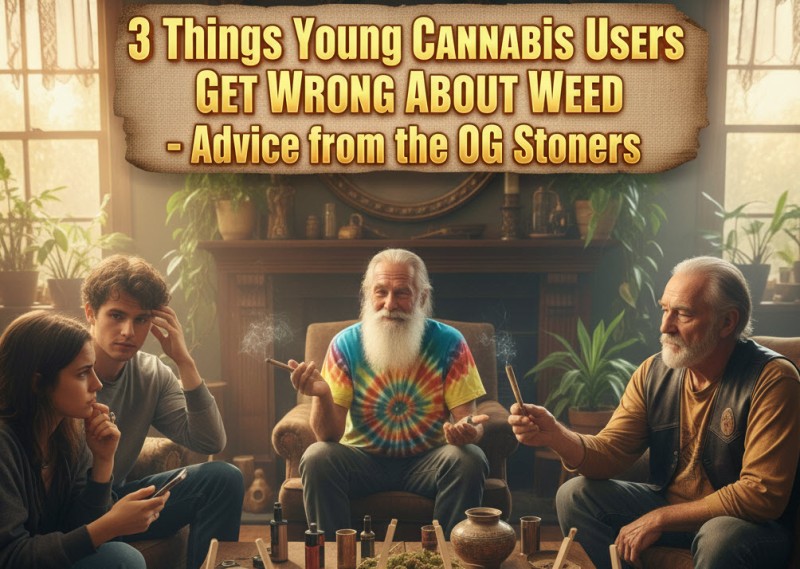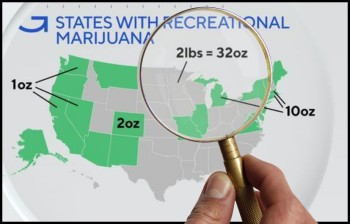
What Young Stoners Get Wrong About Weed: Cannabis Wisdom from Two Decades of Cannabis Evolution
After over twenty years of cannabis consumption, I've watched my relationship with the plant evolve through multiple phases - from teenage rebellion to creative catalyst to sophisticated tool for consciousness exploration. Looking back at my early stoner days and observing today's young cannabis enthusiasts, I recognize patterns of misunderstanding that can limit the plant's potential and create unnecessary complications in people's relationships with marijuana.
The fundamental error most young stoners make is treating cannabis as the destination rather than the vehicle. They worship the plant instead of using it as a tool. They build their identity around being a "stoner" rather than integrating cannabis into a broader life purpose. Most critically, they mistake getting high for personal growth, confusing cannabis consumption with consciousness development.
This isn't about judging young people's cannabis use or promoting abstinence - it's about sharing hard-earned wisdom that could help new users develop healthier, more sustainable relationships with marijuana from the beginning. Cannabis is an incredible ally when used skillfully, but it can become a limiting factor when approached without understanding, respect, or intentionality.
The difference between amateur and experienced cannabis use isn't about tolerance levels or exotic strains - it's about understanding cannabis as one tool among many rather than the central organizing principle of your existence. Young stoners often need to learn this through experience, but perhaps some guidance can accelerate the wisdom acquisition process.
The Early Days: Cannabis as Identity and Escape
When I started smoking over two decades ago, cannabis culture was different. We'd smoke all day, every day, listening to Sublime, skating everywhere, using weed as a medium to explore creativity and adventure. Cannabis was about getting high and having fun - hanging out with friends, doing creative projects, embarking on spontaneous adventures fueled by marijuana-enhanced curiosity and social connection.
There was something pure about that approach in a pre-smartphone era when cannabis sessions created genuine face-to-face community rather than isolated consumption while scrolling through digital distractions. We used weed to enhance real-world experiences rather than escape from them into virtual realities.
But even then, many of us made the classic young stoner mistake of organizing our entire identity around cannabis consumption. Being a "stoner" became our primary self-definition rather than being an artist, athlete, student, or entrepreneur who happened to use cannabis. The plant went from enhancing our interests to replacing them entirely.
Young stoners today often fall into similar identity traps, but with added complications from social media culture that encourages performance of cannabis consumption rather than authentic exploration. They document their smoking sessions for likes and validation rather than using cannabis for genuine personal development or creative expression.
The "wake and bake" lifestyle that many young enthusiasts embrace might seem like cannabis freedom, but it often becomes cannabis prison - a routine that eliminates the special relationship with altered consciousness that makes cannabis valuable in the first place. When you're always high, you're never really high, and the plant becomes background noise rather than a consciousness-shifting ally.
This constant consumption approach also prevents young users from developing the natural rhythm of cannabis use that experienced smokers eventually discover - the cycle of consumption, integration, reflection, and conscious re-engagement that maximizes the plant's benefits while minimizing tolerance and dependence issues.
The Evolution: From Recreation to Tool
As my relationship with cannabis matured over the years, fundamental shifts occurred in how I approached consumption. Cannabis transformed from a recreational activity into a sophisticated tool for specific purposes: creativity enhancement, stress management, consciousness exploration, social lubrication, and spiritual practice.
The most significant change was developing selectivity about when, where, why, and what I consumed. Instead of smoking whatever was available whenever the opportunity arose, I became intentional about cannabis use - choosing specific strains for particular effects, timing consumption around activities that would benefit from enhancement, and maintaining periods of abstinence to preserve sensitivity and prevent habituation.
Quality became more important than quantity. Rather than accepting whatever cannabis was available, I developed preferences for specific terpene profiles, cultivation methods, and effect characteristics. This wasn't cannabis snobbery - it was recognition that different cannabis produces dramatically different experiences, and optimizing the input improves the output.
The relationship became bidirectional rather than one-sided. Instead of just consuming cannabis, I began studying the plant, learning about cultivation, understanding cannabinoid interactions, and eventually growing my own medicine. This deeper engagement created appreciation for cannabis as a living ally rather than just a commodity to be consumed.
Most importantly, cannabis stopped being the center of activities and became a potential enhancement to activities that were already meaningful. Instead of organizing life around cannabis consumption, I integrated cannabis into a life organized around purpose, relationships, creativity, and growth.
This evolution didn't happen overnight - it took years of experimentation, mistakes, tolerance breaks, and conscious reflection to develop a mature relationship with the plant. But the destination was worth the journey: cannabis as a powerful ally rather than a recreational distraction.
The Sophistication of Strain Selection
One of the clearest indicators of cannabis maturity is developing sophisticated preferences for specific strains and effects rather than treating all cannabis as interchangeable. Young stoners often approach marijuana with a "weed is weed" mentality, focusing primarily on potency (THC percentage) while ignoring the complex interplay of cannabinoids, terpenes, and growing conditions that determine the actual experience.
Experienced users learn to read their bodies and minds to understand how different cannabis affects their particular physiology and psychology. Some strains enhance creativity while others promote relaxation. Some facilitate social interaction while others support introspection. Some energize while others sedate. Learning these distinctions allows for intentional consumption that serves specific purposes rather than random intoxication.
The development of refined preferences often leads to quality over quantity approaches that young stoners might initially resist. I'd rather not smoke than consume subpar cannabis that doesn't serve my intentions or meet my standards. This isn't elitism - it's recognition that cannabis consumption should enhance life rather than just providing temporary escape from it.
This sophistication naturally leads many experienced users toward cultivation, either growing their own plants or developing relationships with growers who share their commitment to quality and intentionality. When you understand what good cannabis can do, you become motivated to ensure access to good cannabis rather than settling for whatever's available in commercial markets.
The journey from "any weed will do" to "I only want specific effects from particular strains grown in certain ways" represents maturation in cannabis relationship that young users can accelerate by paying attention to how different cannabis affects them rather than just seeking maximum intoxication.
Cannabis as Tool, Not Master
The most crucial lesson experienced cannabis users learn is treating the plant as a tool rather than a master. Cannabis serves human purposes rather than humans serving cannabis consumption. This represents a fundamental shift in relationship that determines whether cannabis enhances life or becomes a limiting factor.
When cannabis functions as a tool, consumption becomes intentional rather than habitual. You use cannabis to achieve specific outcomes - enhanced creativity for artistic projects, relaxation after stressful periods, social lubrication for gatherings, consciousness exploration for personal growth. The plant serves your goals rather than becoming the goal itself.
Tool-based cannabis use naturally includes periods of abstinence when the tool isn't needed or when maintaining sensitivity requires breaks from consumption. These tolerance breaks aren't deprivation - they're strategic choices that preserve cannabis effectiveness while preventing habituation that reduces the plant's benefits.
Young stoners often resist the idea of cannabis breaks because they've organized their social lives and daily routines around consumption. But experienced users understand that occasional abstinence enhances cannabis experiences while providing opportunities to pursue activities that don't benefit from altered consciousness.
The tool relationship also includes willingness to modify consumption patterns based on life circumstances, goals, and responsibilities. Sometimes more cannabis serves your purposes, sometimes less, sometimes none at all. Flexibility in the relationship indicates maturity rather than rigidity that sacrifices life goals for consumption preferences.
Most importantly, the tool perspective maintains cannabis as one resource among many rather than the primary resource for managing consciousness, stress, creativity, or social interaction. Experienced users develop multiple tools for consciousness work - meditation, exercise, breathwork, therapy, education - with cannabis serving as one valuable option rather than the only option.
The Wisdom of Integration
Perhaps the most sophisticated aspect of mature cannabis use involves integration - the process of translating insights and experiences from altered states into improvements in ordinary consciousness and daily life. Young stoners often treat cannabis sessions as separate from "real life" rather than opportunities for growth that can enhance all aspects of existence.
Integration requires conscious reflection on cannabis experiences rather than just enjoying them and moving on. What insights emerged during the session? What patterns became visible? What creative ideas arose? What emotional material surfaced? Taking time to process and apply these discoveries transforms cannabis from entertainment into education.
The integration process also includes developing practices that maintain access to cannabis-inspired insights during sober periods. This might involve journaling, artistic expression, meditation, or other activities that help anchor elevated states and perspectives in ordinary consciousness.
Experienced users learn to approach cannabis as a teacher rather than just a good time. They ask questions during sessions, pay attention to the plant's effects on their consciousness, and treat altered states as opportunities for learning rather than just feeling good.
This teacher relationship creates accountability in cannabis use that prevents many of the problems young stoners encounter. When you're learning from the plant rather than just using it, consumption naturally becomes more intentional, moderate, and integrated with personal development goals.
The Sticky Bottom Line: Respect the Plant, Live Your Life
After two decades of cannabis evolution, the most important lesson I can share with young stoners is this: cannabis is an incredible ally when treated with respect and used skillfully, but it becomes a limiting factor when worshipped or used unconsciously.
Don't build your identity around being a stoner - build your identity around being whoever you want to become, with cannabis serving as one tool among many for achieving your goals. Don't organize your life around cannabis consumption - integrate cannabis into a life organized around purpose, relationships, creativity, and growth.
Develop selectivity about when, where, why, and what you consume. Quality matters more than quantity. Intentionality matters more than habit. Integration matters more than intoxication.
Take breaks to maintain sensitivity and pursue activities that don't benefit from altered consciousness. Develop multiple tools for consciousness work, stress management, creativity, and social connection. Let cannabis enhance your life rather than replacing it.
Most importantly, remember that the goal isn't to become a better stoner - it's to become a better human who happens to use cannabis wisely. The plant can teach you about consciousness, creativity, empathy, and presence, but only if you approach it as a student rather than just a consumer.
Cannabis has been my ally for over twenty years because I've learned to use it as a tool rather than worshipping it as a master. Young stoners who develop this relationship early will save themselves years of trial and error while maximizing the plant's incredible potential for enhancing human consciousness and experience.
Respect the plant, but live your life. Cannabis is awesome - just don't worship it.






